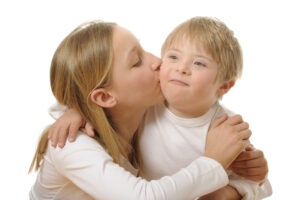
Children normally learn to move by themselves. Through random movements, a new-born discovers the use of its nervous system to move its muscles. It develops movement patterns and behavioural patterns and ingrains these. For most children, this happens spontaneously and autonomously.
More and more, the child will attach meaning to the enormous amount of stimuli which it experiences. The job of the brain is to process these stimuli. It filters out ‘noise’ and distils meaningful and useful information. Sometimes this does not happen automatically.

Some children are not able to undergo these processes by themselves due to neurological, psychological or physical causes. They may not experience important developmental stages such as rolling, sitting, crawling or walking. In milder cases, a child may struggle to keep up with his peers in certain areas. Its process of learning and development is hampered. Neuromovement uses movement to provide information to the brain. New nerve connections are laid, which leads to an improvement in function.
Examples of when Neuromovement can be useful may be found here.